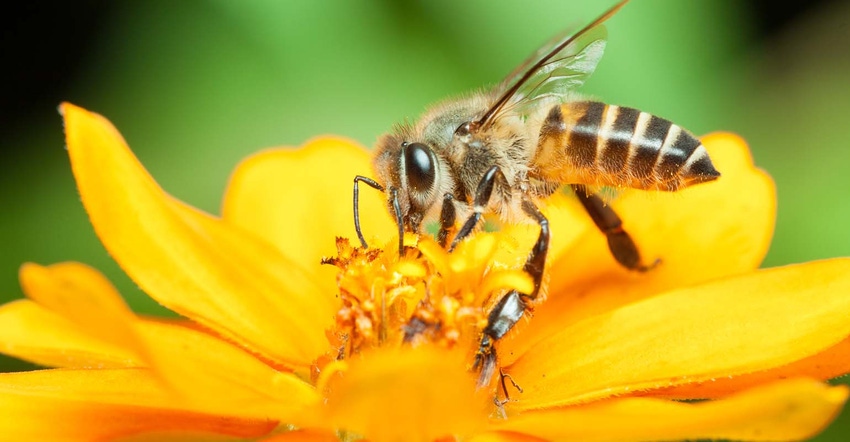
by Stephanie Bodoni
Bayer AG and Syngenta AG, two of the agrichemical giants trying to win the European Commission’s blessing for deals reshaping the global industry, clashed with the EU over bans on insecticides that regulators blame for killing honeybees.
The EU action not only damages farmers, the agricultural industry and the environment, but throws companies into legal uncertainty, Bayer said on the first day of hearings at the EU’s General Court in Luxembourg. BASF SE is also lining up to attack 2013 bans of previously approved pesticides, based on new studies the EU said showed “unacceptable” risks to Europe’s bee population.
“The commission is asking you to give it unlimited powers to withdraw existing approvals as and when it pleases,” Kristina Nordlander, a lawyer representing Bayer, told a five-judge panel on Wednesday. The EU decision was a “disproportionate and intolerable interference” with its rights, according to Bayer.
Bee deaths reached alarming levels over a decade ago, when scientists identified Colony Collapse Disorder, a syndrome without a known cause, in which disoriented bees fail to find their way back to their hives and die. Bee welfare has triggered a wave of protests from environmental campaigners at EU level.
The legal fight comes as EU competition watchdogs are poring over the potential threat to innovation as they weigh a trio of mega deals in the industry that have also triggered protests from Green groups.
Trio of Deals
Officials have opened in-depth probes into China National Chemical Corp.’s agreement to buy Syngenta and DuPont Co.’s $74 billion tie-up with Dow Chemical Co. Bayer’s agreement to buy Monsanto Co. is also certain to fall under the EU’s remit once it’s formally notified to the Brussels authority.
The EU restrictions forced farmers to revert to older, “potentially more harmful chemicals that are sprayed on the fields,” but the commission made no assessment of what would happen after its decision, said Nordlander. “Most insecticides on the market will harm bees” but are considered safe by the commission, while neonicotinoids are “the most modern technology to minimize exposure to bees.”
The EU from December 2013 imposed limits on the use of three so-called neonicotinoids -- clothianidin, imidacloprid and thiametoxam -- saying they were “harmful” to Europe’s honeybee population, when used to treat bee-attractive plants and cereals. Studies at the time suggested exposure to neonicotinoids at sub-lethal doses can harm bee health and bee colonies, the European Food Safety Authority said in a report that formed the basis of the EU decision. More study is needed to fill in data gaps, the authority said at the time.
The commission said its findings showed that neonicotinoids, or neonics, are “systemic,” causing the entire plant to become toxic to bees and with this “very disturbing scientific information, it was not possible to postpone the decision by several years,” said Petr Ondrusek, a lawyer for the Brussels-based commission.
Leverkusen, Germany-based Bayer, the world’s biggest maker of neonics, has previously warned that the increased presence of varroa, which predates the introduction of its chemicals, is the biggest factor behind the increased losses.
“There is no evidence” despite “over 20 years of intense study that neonicotinoids have any link to colony honeybee losses,” said Nordlander.
Syngenta, which will plead in court Thursday, is arguing that the EU imposed the restrictions after “an unreasonable mandate given to EFSA, a rushed procedure that failed to allow proper input from stakeholders, failed to take relevant science into account and without any impact assessment.”
The commission “responded to a ’weight of noise’ instead of the ’weight of evidence’ which clearly shows that in reality neonicotinoids pose a minimal threat to bee health compared with a lack of food, diseases, and cold weather -- a view shared by respected regulators around the world,” Basel, Switzerland-based Syngenta said in a statement.
Ludwigshafen, Germany-based BASF will face the EU judges Friday to challenge a separate EU ban in 2013 of its insecticide fipronil.
The EU court cases are: T-429/13, Bayer CropScience v. Commission, T-451/13, Syngenta Crop Protection and Others v. Commission, T-584/13, BASF Agro and Others v. Commission.
To contact the reporter on this story: Stephanie Bodoni in Luxembourg at [email protected]
To contact the editors responsible for this story: Anthony Aarons at [email protected]
Peter Chapman, Bruce Rule
© 2017 Bloomberg L.P
About the Author(s)
You May Also Like




